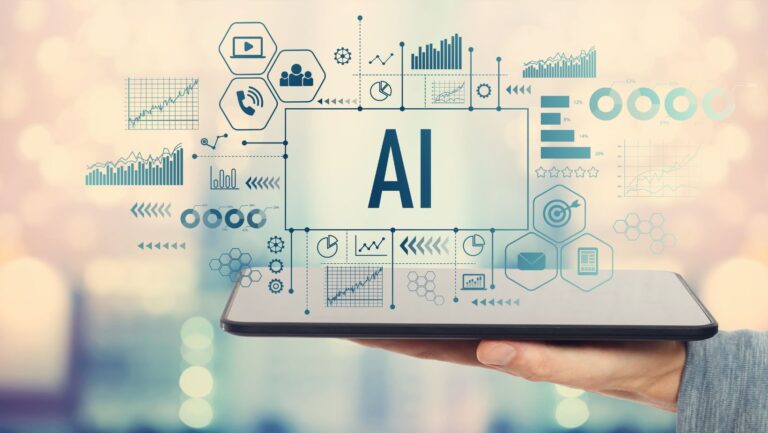AI Empowering business growth & Security with next-generation
Artificial Intelligence (AI) has emerged as a transformative technology in the modern business landscape, driving unprecedented growth and revolutionizing operations across industries. Next-generation AI is characterized by advanced algorithms, machine learning capabilities, and natural language processing, empowering businesses with unprecedented insights and decision-making capabilities.
This article explores the role of next-generation AI empowering business growth and ensuring robust security measures. We will delve into its applications for automation, data analytics, customer experience, innovation, and supply chain optimization.
Additionally, we will explore how AI reinforces cybersecurity, fraud prevention, regulatory compliance, data privacy, and disaster recovery. Understanding the potential of AI and the ethical implications of its integration is crucial for harnessing its full potential.

AI for Business Growth
1. AI-Driven Automation for Increased Efficiency
Next-generation AI empowering business growth has significantly impacted businesses through process automation. Streamlining operations and reducing human errors can be achieved by outsourcing repetitive tasks to AI-powered systems.
Chatbots for customer support and automated invoice processing are just some examples of how AI streamlines workflows, making it easier for humans to do more creative and strategic work. The increased efficiency translates to higher productivity, faster response times, and cost savings.
2. Leveraging AI in Data Analytics for Actionable Insights
Data is a valuable asset for businesses, but its real value lies in actionable insights. Next-generation AI empowering business growth excels in processing and analyzing massive datasets to identify patterns, trends, and correlations.
These insights enable data-driven decision-making, empowering businesses to refine strategies, optimize operations, and anticipate market demands.

3. Personalization and Improved Customer Experience through AI
AI-driven personalization has revolutionized customer experience across industries. By analyzing customer behavior, and preferences, businesses can deliver tailor-made recommendations, content, and services. Personalized experiences foster customer loyalty, drive repeat business, and boost customer satisfaction levels.
4. AI-Driven Innovation and Product Development
Next-generation AI accelerates innovation and product development by simulating scenarios, modeling designs, and predicting outcomes. AI-driven simulations enable businesses to experiment with ideas, iterate rapidly, and reduce the time to market for new products and services.
5. AI's Impact on Supply Chain Optimization and Predictive Maintenance
AI’s application in supply chain management optimizes inventory management, demand forecasting, and logistics. It enables businesses to achieve cost efficiency, minimize stock outs, and enhance overall supply chain performance.
AI-powered predictive maintenance prevents costly downtime by anticipating equipment failures and scheduling maintenance proactively.

AI empowering business growth & Security
1. AI-Powered Cybersecurity Measures and Threat Detection
As cyber threats evolve in sophistication, AI plays a crucial role in bolstering cybersecurity measures. AI-powered cybersecurity solutions can detect anomalies, identify potential threats, and respond to attacks in real time.
Machine learning algorithms enable systems to adapt to emerging threats, enhancing the security posture of organizations.
2. AI's Role in Fraud Prevention and Risk Management
Fraudulent activities pose significant risks to businesses. AI’s ability to analyze vast amounts of data and detect irregular patterns empowers organizations to combat fraud effectively.
AI-driven risk management models evaluate various factors to assess and mitigate potential risks, safeguarding businesses against financial losses.

3. Ensuring Compliance and Regulatory Adherence with AI
Compliance with regulations is critical for businesses to maintain their reputation and avoid legal consequences. AI can assist in identifying compliance gaps, monitoring changes in regulations, and ensuring adherence to complex compliance requirements.
4. AI for Data Privacy and Confidentiality Protection
Data privacy is a paramount concern for businesses handling sensitive information. AI helps safeguard data through encryption, access controls, and anomaly detection. AI-driven data governance and privacy tools ensure personal and confidential data protection.

5. AI-Enabled Disaster Recovery and Business Continuity Planning
Disruptions in business operations can occur due to various factors, such as natural disasters or cyber-attacks. AI can aid in disaster recovery by automating data backup, replicating critical systems, and facilitating the rapid restoration of services.
AI’s predictive capabilities also contribute to better business continuity planning and risk mitigation.
Implementing AI in Business Operations
1. Addressing Challenges in Adopting AI Solutions
Despite the potential benefits & organizations face challenges in adopting AI. These include the complexity of AI integration, data privacy concerns, and the need for skilled AI professionals. Addressing these challenges requires strategic planning and investment.
2. Strategies for Successful AI Implementation
Effective AI implementation requires a clear roadmap, involving stakeholders from different departments. Businesses must define the objectives, identify the right AI technologies, and ensure seamless integration with existing systems.

3. Upskilling Employees to Work Alongside AI Systems
AI’s collaboration with human intelligence requires a workforce with AI literacy. Upskilling employees to work alongside AI systems fosters a collaborative environment, empowering employees to leverage AI tools effectively.
4. Ethical Considerations and Responsible AI Practices
AI’s growing influence raises ethical concerns related to bias, transparency, and accountability. Ethical AI practices, such as fairness in algorithm design and responsible data usage, are vital in maintaining public trust and avoiding negative consequences.

Conclusion
The potential of next-generation AI empowering business growth is boundless, with its impact on business growth and security continuously expanding. Businesses that embrace AI responsibly can unlock new opportunities, improve customer experiences, and optimize operations. However, addressing ethical concerns and ensuring responsible AI integration is essential for sustainable development and long-term success. As AI technology evolves, organizations must stay abreast of advancements to harness their full potential in shaping the future of business and security.
From automation, data analytics to customer experience and supply chain optimization, AI is enabling businesses to drive efficiency, make data-driven decisions, and innovate at a rapid pace. With AI-powered automation, organizations can streamline operations, reduce errors, and improve productivity. The insights generated by AI-driven data analytics enable businesses to refine strategies, anticipate market demands, and optimize operations. Personalized customer experiences foster loyalty and satisfaction, while AI-driven innovation accelerates product development.
As a trusted partner, IBU Consulting is committed to helping businesses leverage the power of next-generation AI. Our team of experts can assist you in implementing and optimizing AI solutions, ensuring seamless integration and maximum benefits. Contact us today to harness the full potential of AI empowering business growth & enhancing security for sustainable success.
FAQ's
Next-generation AI refers to advanced AI technologies that incorporate machine learning, natural language processing, and sophisticated algorithms. It empowers businesses by providing insights, automation, and improved decision-making capabilities.
AI-driven automation streamlines operations by handling repetitive tasks. For example, chatbots can provide customer support, and automated systems can process invoices, leading to increased efficiency, cost savings, and higher productivity.
AI helps identify compliance gaps, monitors changes in regulations, & ensures adherence to complex compliance requirements. It also aids in data privacy through encryption and access controls.
AI-driven personalization enhances customer experiences by delivering tailor-made recommendations and services, driving customer loyalty, repeat business, and ultimately, business growth.
